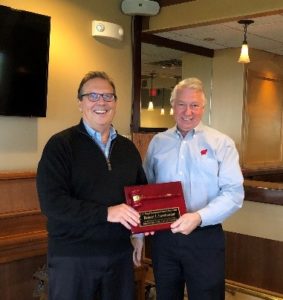On Oct. 12, 2018, W CJC presented the James E. Hough Distinguished Service Award to Robert Fassbender. Bob helped co-found the Wisconsin Civil Justice Council in 2009 and served as its Executive Director until he retired from the Hamilton Consulting Group in December 2017. During his tenure as Executive Director, WCJC experienced unprecedented success, which started in 2009 when WCJC helped defeat numerous bills introduced at the behest of the plaintiff’s bar. Beginning in 2011 and lasting through 2017, Bob helped lead the coalition in passing an unprecedented number of civil justice bills supporting the business community and helping Wisconsin gain national recognition.
CJC presented the James E. Hough Distinguished Service Award to Robert Fassbender. Bob helped co-found the Wisconsin Civil Justice Council in 2009 and served as its Executive Director until he retired from the Hamilton Consulting Group in December 2017. During his tenure as Executive Director, WCJC experienced unprecedented success, which started in 2009 when WCJC helped defeat numerous bills introduced at the behest of the plaintiff’s bar. Beginning in 2011 and lasting through 2017, Bob helped lead the coalition in passing an unprecedented number of civil justice bills supporting the business community and helping Wisconsin gain national recognition.
The Distinguished Service Award is presented in honor of James E. Hough, former Hamilton Consulting Group partner, who for many years represented Wisconsin business interests in civil justice matters before the Wisconsin Legislature.
